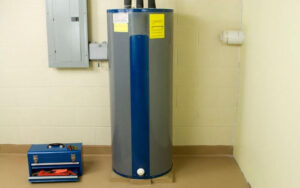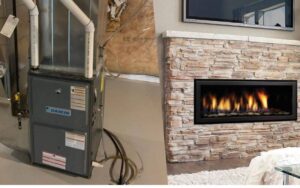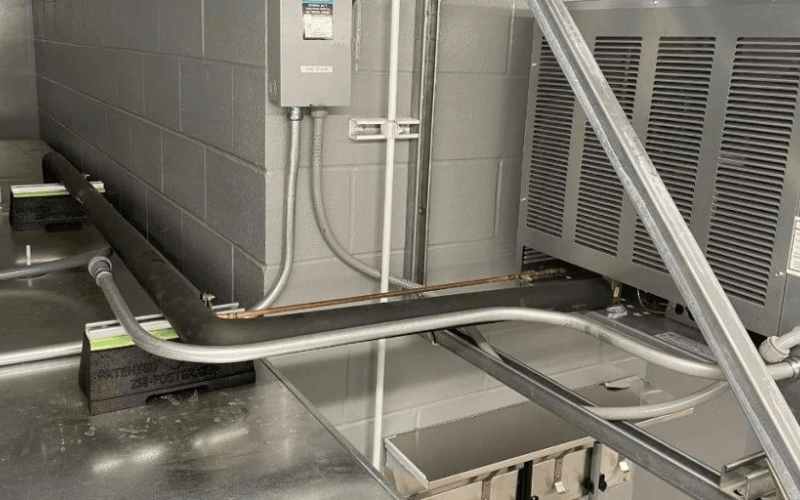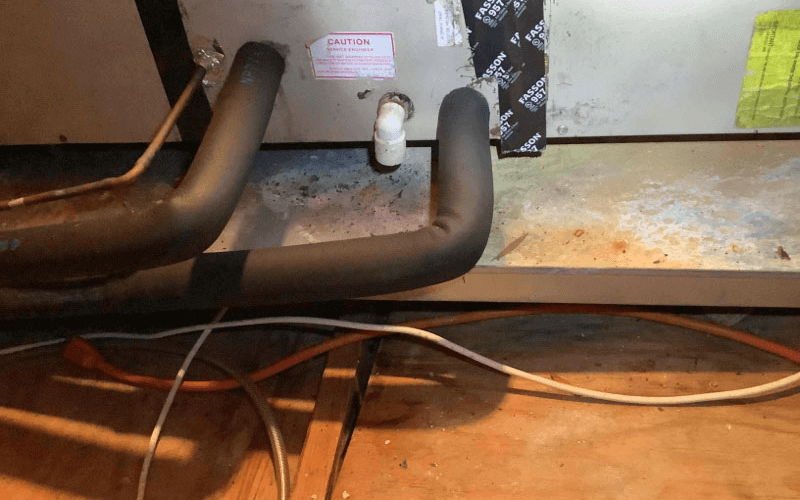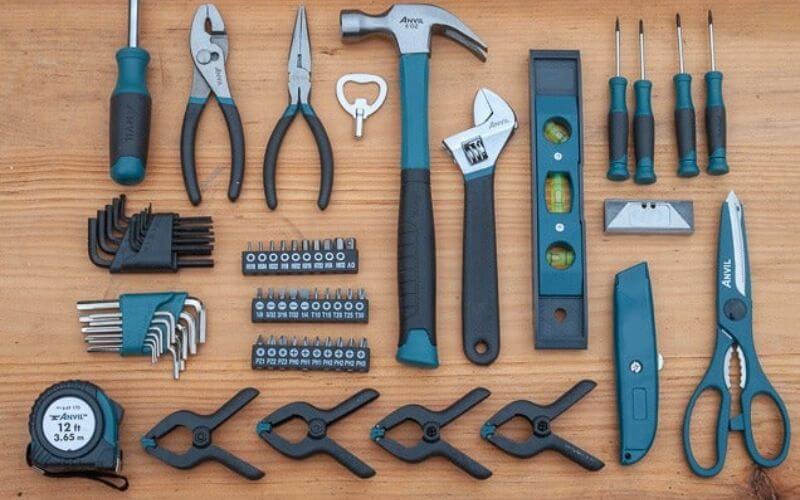A small amount of water dripping from the air conditioner is normal (AC). However, you should investigate if water is forming beneath the device, leaking from within, or blowing out the vent. We looked into possible causes to determine why the air conditioner blew water.
Water spouting from the air conditioner is not always dangerous. However, it can damage the unit over time if left unchecked. If you notice water spouting, check the following:
- A clogged drain lines
- Improper installation
- Frozen Freon coil
- A clogged air filters
You must also identify the liquid that is leaking from the AC unit. Condensation caused by moisture in the cold coil is desirable. Coolant leaks, however, can be hazardous to your health and the environment.
HVAC technicians can inspect and identify them using soap bubbles, UV dyes, or electrical leak detectors. Is everything a little too technical? Don’t be concerned. We will break it down further for you as you read. Even if you can rely on HVAC professionals to solve the problem, knowing what’s wrong with your air conditioner would be beneficial. You can keep track of repairs, make educated decisions, and avoid overcharging for unnecessary maintenance.
Table of Contents
ToggleIs spitting water from the air conditioner normal?
A small amount of water from the air conditioner is ordinary and necessary for cooling. It can use 5 to 20 gallons of water, which is fine. It is not normal when the water inside is dripping or the spray appears to come from a pressure hose.
How do I know if my air conditioner is leaking water or refrigerant?
Soaking a cloth in soapy water and sparkling water, then wiping off the condenser and evaporator coils, it easy to tell if an air conditioner is losing water. If it foams, it means Freon is escaping. Because Freon is odorless and colorless, detecting leaks is difficult. Freon’s Leakage negatively impacts health and can cause dizziness, headaches, vomiting, and nausea.
Why the air conditioner is spraying water
There is concern that the AC unit will leak or splash too much water. Leaks have the exact cause: windowed, centralized, ducts, or split. Here are some of the possible reasons for your device blowing water:
Drain line clog
Although a small amount of water is normal in the drain pan, the drain line may become clogged if it is full. The air blown into the coil may pick up dust and dirt, which mixes with the water dripping from the drain line. Debris can clog the drain, recirculate through the drain system, and blow the water out of the duct.
Improper installation
Because of improper installation, the AC unit placement and angle are not horizontal. Place the air conditioner on a flat surface at least 3-4 feet away from the ground, or tilt it slightly outwards. The unit cannot be listed more than 0.5 inches at the front end to allow the condensate to drain outwards. Incorrect installation can result in poor air circulation, leaks in the air ducts, and compressor damage. Leaks, poor cooling performance, and electrical issues are common signs of poorly installed units.
Coils of Frozen Freon
Frozen coils can occur due to dirt on the filter, low refrigerant filling, fan malfunction, cold weather, and other factors. It can all result in significant leaks and splashes. Frozen coils are not always visible and are challenging to diagnose, but some symptoms indicate that there is a problem.
One of the first signs that the coil has frozen is that the air conditioner is no longer as cold as it once was. If you examine the airflow in the supply register, you will notice that it is warm or that no air is blowing. If you suspect a coil freeze, turn off the air conditioner immediately, unplug the power cord, and do not use it until the problem is resolved.
Dirty Air Filter
Filters that are dirty impact the overall performance of the AC unit. It restricts the flow of air and can cause the coil to freeze. During defrosting, excess water will flow into the drain pan, causing a leak. Regular filter replacement and cleaning improve device performance and extend its lifespan.
Don’t know which filter to use? Read A quick guide to the best air filter for your air conditioner.
Cleaning the AC filter once every two weeks or more is recommended in a dusty environment. A simple cleaning with soap and water and a soft cloth, without harsh detergents, should suffice. The flat filter should be replaced once a month, and the pleated filter every three months.
Is your window air conditioner leaking water? Read Why is my window air conditioner leaking water to solve this problem.
How to Repair an Air Conditioner That Is Spitting Water
If you discover a leak, turn off the air conditioner, unplug it, and turn off the breaker. Compressors, for example, may be damaged. The primary filter and drain line can be safely cleaned, which is the first sign of poor AC performance.
If cleaning does not solve the problem, it may be time to call a professional maintenance team. They conduct regular inspections, thoroughly clean the filters, adjust the components, and ensure proper installation.
Cleaning and regular maintenance are required to prevent air conditioning system leaks. Airflow and cooling performance will improve if the system is not obstructed. We recommend that you replace the filters regularly, clean the clogged drains, and have a professional repair the air conditioner at least once a year.
Conclusion
Dirty filters, clogged drains, pipe failures, and frozen Freon coils are the most common causes of water leaks and splashes from AC units. You can clean the filter yourself without risking damage to your device. If that does not solve the problem, the best solution is to seek the assistance of an expert. Regular filter cleaning and annual professional maintenance will help your air conditioner last longer.


